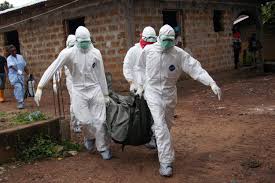Dear Madame Lagarde
In March 2014, Liberia was hit by the unprecedented outbreak of the deadly Ebola Virus Disease (EVD). (photo: IMF Chief Lagarde and president Sirleaf).
The outbreak permeated the social and economic fabric of our country, significantly undermining our economic activities and thwarting our medium-term development program – the Agenda for Transformation (AfT).
However, the measures put into place, including actions aimed at preventing and controlling infection rates, increasing community engagements and ensuring safe burials, as well as the support of our development partners and the international community, have led to successful containment of the epidemic.
On September 3, 2015 our country was declared Ebola free for the second time by the World Health Organization (WHO). Liberia became the first of the three most-affected countries in West Africa to have been declared Ebola free after more than a year of battling the epidemic, even though more recently there have been a few isolated cases.
We are grateful to the IMF for the financial support it provided to Liberia during the crisis for a total of US$130 million through an ad-hoc augmentation under the ECF, disbursement under the Rapid Credit Facility (RCF), and debt relief under the Catastrophe Containment and Relief (CCR) Trust.
The economic impact of Ebola has been compounded by the steep decline in commodity prices.
Prior to the outbreak, our country had been growing at about 8 percent on average since 2011, domestic institutions were being re-built and social and health indicators were improving. However, the epidemic weakened activity in all sectors of the economy, with real GDP growth declining from close to 8½ percent in 2013 to 0.7 percent in 2014.
 As the country embarked on the road to recovery in 2015 after the devastating Ebola crisis, it is being further confronted by the sharp decline in prices of our major exports, namely iron ore and rubber.
As the country embarked on the road to recovery in 2015 after the devastating Ebola crisis, it is being further confronted by the sharp decline in prices of our major exports, namely iron ore and rubber.
As a result, planned investments in the mining sector have been put on hold by existing mining operators. A prolonged period of low commodity prices would significantly undermine our tax and export revenues, and could significantly weaken our medium term growth prospects.
We remain fully committed to the objectives set under our ECF-supported program, although the Ebola outbreak weakened our capacity and led to delays in program implementation.
Taking into account the extremely challenging context, looking back to June and December 2014, our performance remained broadly satisfactory. We met most of the end-June 2014 quantitative performance criteria (PCs) and indicative targets (ITs) except the floor on government revenues, net foreign exchange reserves position, and the ceiling on net domestic assets of the central bank.
We missed the floor on government revenues owing to shortfalls in tax and nontax revenues. The floor on net foreign exchange position was missed following a placement of reserves with a domestic LIBERIA 2 bank.
Nonetheless, revenue performance improved markedly in FY2015 in part with the establishment of the Liberia Revenue Authority (LRA) on July 1, 2014. We met only two out of seven end-December 2014 PCs due to the Ebola outbreak.
We met three out of seven structural benchmarks (SB) (payroll cleanup, publication of FY2016 budget calendar, and pilot on integration of credit-financed projects into the Integrated Financial Management Information System (IFMIS)), whereas the SBs on enhancing cash and liquidity management, strengthening the quality of national accounts and submitting the insurance law were completed but with a delay.

No comments:
Post a Comment